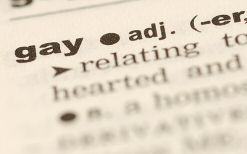Home Page
The latest articles, features and news.


Read About...


|
| | |
|
27 June 2011
Coming Out not always beneficial
by George Atkinson 
The psychological benefits of coming out as lesbian, gay, or bisexual can be substantial for some, but non-existent for those in an unsupportive environment, suggests a new study appearing in the journal Social Psychology and Personality Science. "In general, research shows that coming out is a good thing," says study co-author Richard Ryan, at the University of Rochester. "Openness allows gay people to develop an authentic sense of themselves and to cultivate a positive minority sexual identity. By contrast, being closeted poses serious psychological risks, including more troubled romantic relationships, more distress, and even increased suicidal tendencies." But the new study shows that environment plays a huge role in determining if coming out actually makes a person happier. Among accepting groups, individuals experience significant psychological payback from being open about their sexual identity. But among hostile groups, the costs and stigma of identifying as lesbian, gay, or bisexual cancel out these benefits. "Those who come out may actually feel no better than those who conceal," said study leader Nicole Legate, also from Rochester University. For the study, the researchers asked lesbian, gay, and bisexual individuals detailed questions about their experiences with five groups: friends, family, coworkers, school peers, and religious community. The anonymous participants were recruited from discussion boards as well as community and social networking web sites. For each of the five contexts, participants indicated their level of outness, their sense of well-being, and their perceptions of acceptance or autonomy support.
The researchers found the participants were more closeted in environments they rated as controlling and judgmental. They kept their sexual orientation hidden the most in their religious communities (69 percent), schools (50 percent), and at work (45 percent) and were somewhat more open with their families (36 percent). Friends by far represented the most accepting group for most lesbian, gay, and bisexual individuals. All but 13 percent of participants had come out to their friends. Interestingly, age made no difference in who comes out. Nor did gender or sexual orientation. Instead, the key determinant for revealing a minority sexual orientation was the supportiveness of the environment. "The vast majority of gay people are not out in every setting," says Ryan. "People are reading their environment and determining whether it is safe or not." Other results from the study suggested that gay men experienced lower well-being across measures, while lesbians enjoyed the most autonomy support. Lesbians were the most out of the three groups, bisexuals the least. Related:
Gay Communities In Decline
Victimization disrupts hormonal system
Negative feelings about sexuality indicate poor sexual health
Source: University of Rochester
|
|

